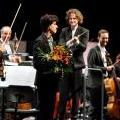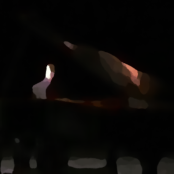Leaderboard
Popular Content
Showing content with the highest reputation on 05/23/2020 in all areas
-
I don't know why more people don't want to do competitions, you're GUARANTEED peer review and a bigger platform to share your music. I'm open to any ideas, I'm thinking solo piano or something similar and simple. Let me know if you're interested and in about a week we'll see who wants to participate and what theme we should use etc. etc. If there are obvious skill differences then we could break it up into groups, but come on people let's get a good group together and see what we all come up with.2 points
-
To me these questions are among philosophical questions for which I can’t find an answer. The same could be asked about fiction, poetry, dance, contemporary film, spectator sports - perhaps even fine art. Basically there’s a human need to self-express or to exercise the imagination – part of a need to assert individuality maybe? Or there was. Film has stolen many people’s ability to visualise and imagine. For those lacking the creative spirit they’ll be entertained - perhaps a result of society constraining people’s lives so it helps take their minds off how vacuous their lives really are: work, rest, eat, sleep, etc. Does contemporary music have purpose? Do these empty lives have purpose? Culture or not, it’s to do with money. My text book “Bluff your way in Music” states very early, “music has long been officially recognised and installed as an Art. And anything that is an art is no longer a simple pleasure. Arts are a by-product of that general symptom of human decline called civilisation. Enjoyable pastimes become arts once money is involved.” Nice piece of cynicism, that – but like all such, it raises an unfortunate truth. So I suppose contemporary music is an enjoyable pastime. It has its following albeit a minor one. It enjoyed a burst of activity (maybe even fashion) during the 20th century – probably from around Schonberg until approx 1980 then reverted to minor interest. It was never a money-spinner, in Europe supported mostly by national broadcasters and philanthropists who financed specialised festivals. Its basic problem is semiotic or linguistic which is why it never reaches mainstream. It survives in academia because universities make it a money-spinner. People take degree courses believing they can learn to compose and these days it’s about contemporary sound organisation to make it seem at the cutting edge. Some graddies go on to compose but usually support themselves in a different trade/profession. Some just don’t bother. And some, like myself, react against the creative immorality – that creativity can be taught at all and try to find their own way to an enjoyable pastime. So…as it lives on donation, it’s only marginally relevant to whatever we assume our culture to be.2 points
-
As a composition student in the Netherlands, which I still believe is one of the best countries for composers to live and work in, I am questioning a lot why I am doing what I am doing. I think the questions that I state below are the ones that I consider the most valuable for contemporary composers regardless the answers I put these questions in the chatbox, but dedicating a topic to this is more convenient for a discussion. I am not sure about the title What is the role of composers or more generally creative artists in society (especially in this crisis)? Is there even such a thing as social purpose in contemporary music? Did society ask for new music? Did people are for innovative / new music? Does contemporary music have a function? I hope that these questions are the beginning for a fruitful, open and respectful discussion!1 point
-
MoveEleven, I read your edited comment and just listened to the Borodin piece. What a beautiful work! Thanks for pointing me to it.Yeah, I can hear that descending progression. Nothing new under the sun, right? I would bet you anything that John Williams was listening to that piece when he composed the score for “E.T. the Extra-Terrestrial” what-do-ya bet! There are subtle little E.T. melodic phrases later in the piece. Like I said; nothing new under the sun. McCartney said he and Lennon used to swipe bits from others all the time. And I’m sure you are familiar with the hauntingly beautiful Eric Carmen song “All By Myself”. I think Rachmaninoff would have loved the melody that Carmen sang over his beautifully melancholic chord progression. I don’t know about you, but I’m a sucker for melancholic tunes (when done tastefully). Don’t get me wrong, not everything is pinched, but it’s fun to find stuff that is whether it was conscious or unconscious. All these guys were fiercely original but every now and then they’d stumble into someone else’s ideas and change things up just enough to not make it obvious. I’m not sure but I think Eric Carmen credited Rachmaninoff in that song... how could he not as it was so obvious. You and I have very similar tastes in composers. I too love Brian Wilson and Burt Bacharach! Ahhh sweet melody! It’s like the seasoning on a nutritious plate of an otherwise bland helping of tasteless grub.1 point
-
MoveEleven, Wow! Thanks man. I'm a HUGE Gilbert O'Sullivan fan. His song "Out Of The Question" is one of my all-time favorites of his. And you're right, there is a chord progression similarity. But I had to go to YouTube to hear "Someday At Christmas" by Stevie Wonder whom I also love. Bullseye!!! You hit that nail on the head. I've always known my little tune "I Don't Want To Think" reminded me of something because the verse melody is so familiar, but I could never think of where I'd heard it. Now, thanks to you, I think maybe my tune was the unconscious work of my cerebral melody blender. I think maybe that I've heard the Stevie Wonder Christmas song before... I must have at some time, probably multiple times, I just haven't etched into the conscious cells in my brain. I (meaning my brain) am always unconsciously piecing together bits and pieces of stuff I've heard. I long ago let go of the desire to "be original". I just make up melodies to please my ears and if it turns out they've already been made then I don't care because creating chord progressions and melodies feels fresh and new to my ears, regardless. Making up tunes is more of a therapy for me than anything else. Anything to escape this Donald Trump nightmare we are all experiencing. I think he actually caught the virus but it managed to escape the junk food sewer that is his body screaming; "No way! I ain't goin' back in there!" Thanks again for the kind words! I seldom ever meet anyone who appreciates Gilbert O'Sullivan so good on ya! And bad on me for putting the name "Donald Trump" in the same paragraph as two truly legendary and inspiring musical titans.1 point
-
I liked this a lot, particularly the opening minute and the pulsing, repeating brass motif. If you're composing by ear, well, you've got a great ear! Well done. I agree with Morgri in that it doesn't feel long enough -- but as you say, it is a work in progress. It's like the orchestral music that plays over the credits at the end of a movie: a review of the highlights of a longer work, put together in a way similar to that of a musical theater overture. The sections are interesting and exciting in themselves, but could use more cohesive material binding them together -- perhaps an overarching theme or motif that can crop up between / amid sections to aid in development and transition. I am guilty of not doing this often enough myself. (I hope that second paragraph doesn't distract you from the fact that I really enjoyed your work as a whole! 🙂) Also, your sound library was a great investment. Sounds amazing.1 point
-
If I did a film I would like to have that music as my soundtrack haha. Really good work dude, I really liked it.1 point
-
I'll take a stab at them, but bear in mind that my answers will undoubtedly be informed by the culture I grew up in (the USA). As you know, the US practically owns the entertainment industry, and artists from all over flock to New York or Los Angeles in an effort to "make it." Americans are avid consumers of entertainment, and the market is therefore rather large. However, the high arts—under whose umbrella I would place contemporary composers—are, by comparison, much less valued by society. (The selection of classical music on streaming platforms such as Spotify, for example, is abysmal.) This may also be true of cultures the world over; all I can speak to is my own culture, though. In essence, I believe that the arts are what connect humans to the divine. I haven't heard of any other animal species being so moved by beauty that they devote their lives to creating it, or weep uncontrollably when confronted by it. For whatever reason, this divine connection is vitally important to humans, and artists have persisted in every culture and every society throughout history. Composers, of course, aren't the only ones who offer this connection, but we are the only ones who bridge that gap through music. (Some could argue that popular music can be divinely beautiful, too, and I won't disagree.) I'm not exactly sure what you mean by "social purpose." If by it you mean "what is contemporary classical music's role in society," then I would say it fulfills the same role as contemporary non-classical music: it's a creative outlet for members of the culture. Whether it resonates with society is another thing entirely, and I suppose some of that depends on exposure, acclaim by the "experts," etc. To be frank, no. The vast majority of humans are traditionalists (in my experience), and the thought of new and different is quite unsettling—to the point of near radicalization if such traditions are threatened. But these very people are our intended audience! I think it's inherent in the being of every artist to leave his/her legacy, and we feel that in order to do so, we must create "originally." Yet we overestimate what originality looks like, and off we go creating radical artwork that is really neither original nor art. As C.S. Lewis put it, “Even in literature and art, no man who bothers about originality will ever be original: whereas if you simply try to tell the truth (without caring twopence how often it has been told before) you will, nine times out of ten, become original without ever having noticed it.” In my own limited experience, I find this to be accurate. It's why so much avant-garde music sits ill with me. Very little of it seems to be created in an effort to capture the composer's truth, but rather as a statement of, "I am radical and original. Accept me on those grounds or not at all." We should rather be about creating truthful music and not working ourselves into a frenzy trying to be original. This, I feel, is the music that resonates with society: the music that speaks to the veracity of human existence. It doesn't have to be new, but it does have to be true. As an expression of members living within a society, it does, indeed, have a function. How far-reaching that function is depends on the skill and intent of its creator. If, as a composer, your goal is for your music to sound like someone else's; or if, on the other hand, your goal is to sound completely original, I think you'll find that your music's function will be limited solely to your own personal enjoyment. The function of contemporary classical music, in my opinion, is to uplift society, to connect humans back to their origin, the divine—whatever you want to call it—through the expression of the composer's own personal truths via music. *** So those are my thoughts. To summarize, my argument is that modern (contemporary) classical music, like all other artforms, is a means of supplying humans with a connection to the beautiful, the divine, etc. Unfortunately, our societies don't assign monetary value to that, so scraping together a living as a composer in that sense is exceedingly hard to do. And, I suppose that's why the questions were posed in the first place. Valuable services are financially compensated; modern classical music isn't compensated; therefore, modern classical music must not be of value. That's a valid logical construct, but the first assumption is incorrect: valuable services aren't always compensated monetarily. The creation of classical music, as an artform, is and will be valuable as long as society produces people to craft it. Composers of it will almost certainly have to find other ways to subsist, but this doesn't undermine its value.1 point
-
I thought this was a good foray into writing a concerto -- I will say that I found it to resemble Bach's Siciliano movement (BWV 1053, ii) a bit too much. I think that it can be beneficial to have models like this, though only as a starting place (for instance, as a basis for the form of your piece). With that said, I think that you manage the textures quite well and that you do a fair job organizing your material. I would not necessarily say that it is short, though, I would avoid thinking of composition in this way. I feel that what's more effective is thinking about how well you explored the areas created by what material you have presented. For instance, asking yourself questions like, "Have I developed my motifs/melodies/textures in a way that is satisfactory?" or, "Am I pleased with how I crafted my music?" Questions like these can help you stay grounded and oriented when writing; either way, it is always safe to say that you have to start somewhere in order to get to where you want. Good job!1 point





